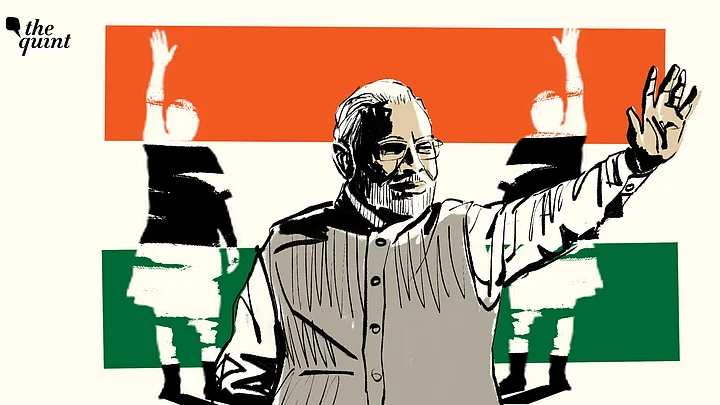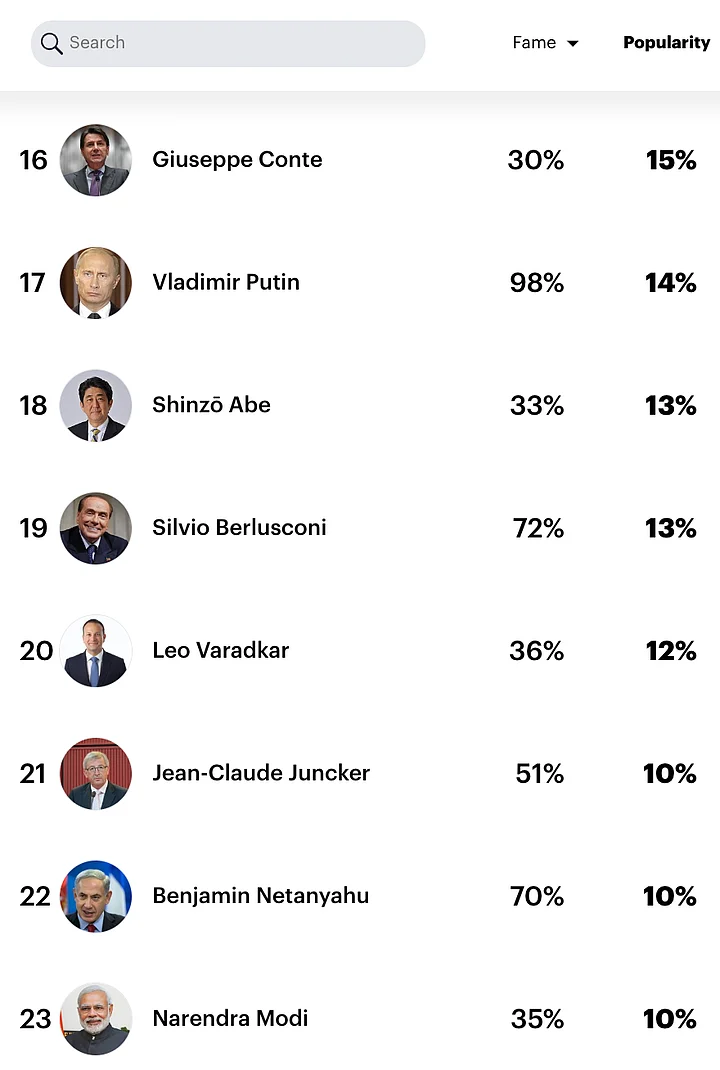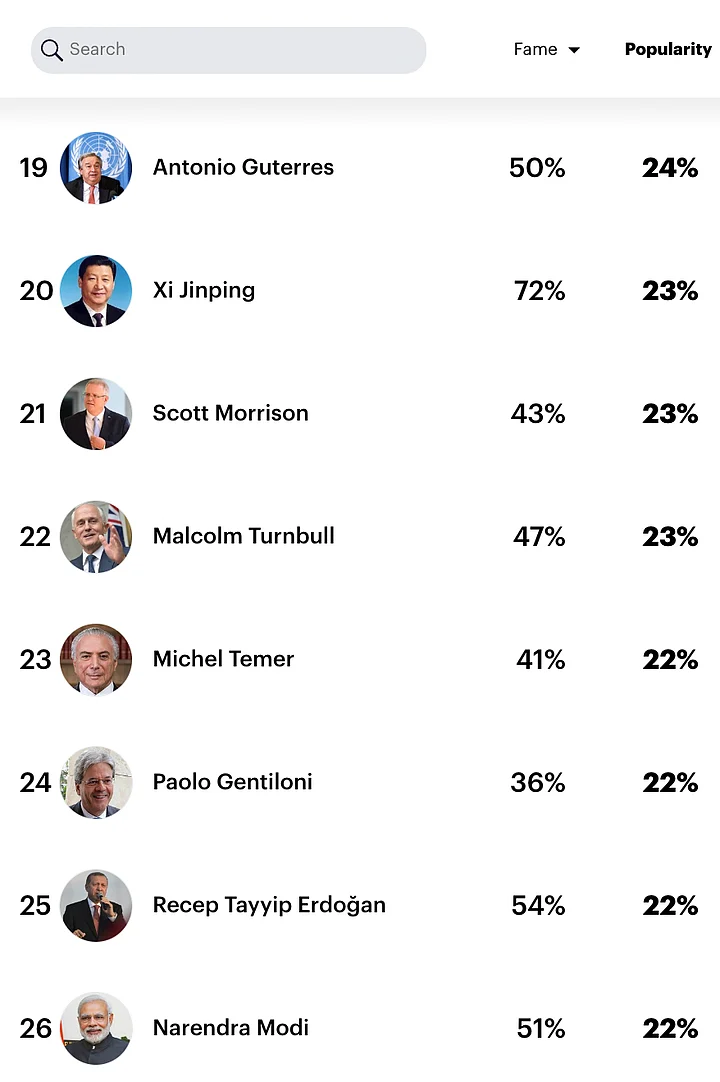"This is a global recognition of [Narendra] Modi ji's undeterred achievements in lifting millions out of poverty, selfless efforts to improve their living standards, and people's unyielding trust in him," Home Minister Amit Shah had said shortly after US-based company Morning Consult stated in September last year that Prime Minister Narendra Modi is the most "trusted" global leader with a 76 percent approval rating.
One of the starkest and incessantly reiterated claims made by the Bharatiya Janata Party (BJP) is that of a "drastic improvement" in India's global stature since 2014 – when the saffron party came to power under the leadership of the juggernaut Modi is considered to be.
Taking digs at the Congress on numerous occasions, PM Modi has himself stated that India does not react to challenges to its foreign policy as "weakly" as the Congress allegedly used to. Joining the chorus, BJP leaders hark on their belief that Modi is the most popular leader in the world, and that the country has garnered more respect under his leadership than at any time in history.
However, is there any truth to these claims? A new study says 'No'.
'The Modi Mirage' – a study based on interviews of 3,000 people across the United States, Britain, and France between 29 March and 8 April this year – finds that the BJP's claims are nothing more than "myths".
According to the study, the majority of people surveyed are concerned about the state of human rights and democracy in India. So much so that they overwhelmingly want to see these issues made conditions for new trade and political negotiations.
Irfan Nooruddin, a professor at the Netherlands' Georgetown University and one of the study's authors, said while speaking to The Quint,
"Awareness of India at the general public level is limited. So, it made sense to conduct the survey at a time when there is heightened attention to India due to the ongoing election."
The study has been co-authored by academics from London University’s School of Oriental and African Studies and Groningen University in collaboration with non-profit Friends of Democracy.
Key Findings
According to the study,
Three out of four respondents express concern over new laws that make it harder for Muslims to become citizens of India, such as the Citizenship Amendment Act (CAA).
90 percent expressed concern at the Indian government’s alleged attempts to assassinate pro-Khalistan US and Canadian citizens on their soil.
89 percent felt that it was important that India protects human rights and democracy if their country is to strengthen ties with it.
88 percent supported human rights being a condition for industrial and other commercial investments in India.
84 percent thought it was important that their government advocates for human rights in India.
The study also cites YouGov polling from March 2024 to state that Modi is neither well known nor popular abroad.
In the US, only 22 percent respondents said that they viewed Modi favourably. In the UK, the figure stands at 10 percent. Not only that, in both countries Modi ranked below Russian President Vladimir Putin and Chinese President Xi Jinping on their level of popularity.
Further, in the backdrop of action by central agencies against Opposition leaders, and crackdowns by the Centre on social media platforms for carrying posts critical of the government, the study cited YouGov for Friends of Democracy as saying that 80 percent of Indians are concerned for the health of the country's democratic standards.
Data pertaining to hate crimes, arrests made under contentious laws, and unequal wealth distribution further highlighted India's alleged falling democratic standards.
According to the authors, there has been a 300 percent increase in hate crimes against minorities under the BJP.
20 companies now generate 70 percent of all profit in India, which also ranks 10th in the crony capitalism index.
6,677 civil society organisation licenses have been revoked under the Foreign Contribution (Regulation) Act in the last five years.
554,034 people have been incarcerated in India in 2021. Three-quarters of them have not been tried.
10,000 people had been arrested under the 50-year-old Unlawful Activities (Prevention) Act (UAPA) from 2014-20, out of which 253 were convicted.
What's Behind the 'Modi Mirage'?
The study then begs the question: If Modi has not in fact dramatically enhanced India's standing and respect on the world stage, what accounts for the widespread perception that he has? What creates this "mirage"?
The authors claim that this may be due to a combination of press censorship and coercion – and increasing levels of disinformation pushed out across social media.
"Insiders report a close direction of the narratives of leading media outlets from the Prime Minister's office, with special attention paid to stories that portray Modi's role in international affairs," the study says, adding, "This direction may for a time have influenced global coverage as well, as media houses often took cues from their Delhi correspondents, who were influenced by the national media environment."
Experts have also ranked disinformation as the number one risk to India, according to the latest World Economic Forum Global Risks Report.
However, authors of the study say that the BJP's electoral success is also owing to the organisational skills of the party and the relative ineffectiveness of the Opposition.
"PM Modi is a very effective politician and the BJP is a very well-organised party. They have done a great job building an effective narrative about development and good governance that has resonated with a plurality of the Indian public over the past ten years," Nooruddin told The Quint.
The BJP’s success in elections at the national and state level have also been aided by a weak and ineffectual Opposition, and in particular the inability of the Congress Party to mount an effective challenge in 2014 or 2019. India is characterised by a young and aspirational society, and the BJP campaign has been effective at capturing that energy.Irfan Nooruddin
Further, while the evidence suggests India's political and economic influence is likely to continue increasing, polling also indicates that its standing is likely to rise quicker if it changes course toward greater respect for human rights and democratic norms.
(At The Quint, we question everything. Play an active role in shaping our journalism by becoming a member today.)


